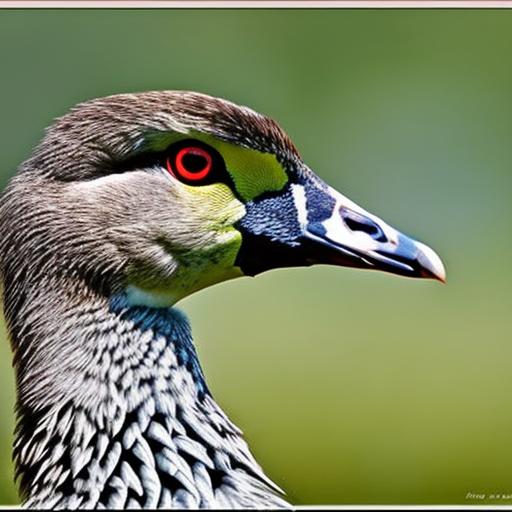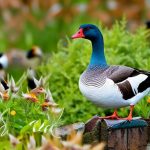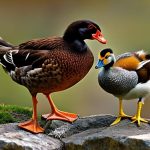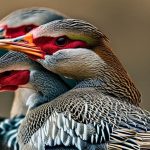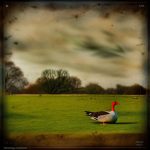Geese invading lawns can be a frustrating problem for many homeowners. These large birds can cause damage to lawns, leave behind droppings that are unsightly and unsanitary, and can even become aggressive towards humans or pets. Finding effective deterrents to keep geese off lawns is essential for maintaining a clean and safe outdoor space. In this article, we will explore various methods and strategies to deter geese from invading lawns, including physical barriers, visual deterrents, sound deterrents, taste deterrents, motion-activated sprinklers, decoys, landscaping techniques, encouraging natural predators, and seeking professional help.
Key Takeaways
- Geese are territorial and will defend their nesting areas aggressively
- Physical barriers like fences or netting can prevent geese from accessing your lawn
- Visual deterrents like scarecrows or reflective tape can scare geese away
- Sound deterrents like loud noises or predator calls can also deter geese
- Taste deterrents like bitter sprays can make your lawn unappealing to geese
Understanding the behavior of geese
To effectively deter geese from invading lawns, it is important to understand their habits and tendencies. Geese are attracted to lawns because they provide easy access to food and water sources. They are herbivores and feed on grass, plants, and grains. Geese also prefer open spaces where they can easily spot predators and have a clear line of sight. They are social animals and often gather in large flocks, which can make them more difficult to deter.
Creating a physical barrier
One of the most effective ways to keep geese off lawns is by creating a physical barrier. Fences or netting can be installed around the perimeter of the lawn to prevent geese from accessing the area. The fence should be at least three feet high and have small openings to prevent geese from squeezing through. Netting can be placed over ponds or other water sources to prevent geese from swimming or landing in the area.
Using visual deterrents
Visual deterrents can be effective in scaring geese away from lawns. Scarecrows or life-sized decoys of predators, such as coyotes or owls, can be placed in the lawn to create the illusion of danger. Reflective tape or shiny objects, such as aluminum foil or CDs, can also be hung around the lawn to create a visual deterrent. The movement and reflection of these objects can startle geese and make them feel unsafe.
Implementing sound deterrents
Sound deterrents can be used to scare geese away from lawns. Noise-making devices, such as air horns or radios, can be placed in the lawn to create loud and unexpected sounds that will startle geese. These devices should be set to go off at random intervals to prevent geese from becoming accustomed to the noise. It is important to note that sound deterrents may also disturb neighbors, so it is essential to use them responsibly and considerately.
Applying taste deterrents

Taste deterrents can be used to make grass taste bad to geese, discouraging them from feeding on lawns. Sprays or other substances can be applied to the grass that have a bitter or unpleasant taste for geese. These deterrents are typically safe for humans and pets but should be used according to the manufacturer’s instructions. It is important to reapply taste deterrents after rain or watering to ensure their effectiveness.
Using motion-activated sprinklers
Motion-activated sprinklers can be an effective way to scare geese away from lawns. These sprinklers are equipped with motion sensors that detect when geese approach and activate a burst of water. The sudden spray of water startles the geese and makes them feel unsafe, encouraging them to leave the area. Motion-activated sprinklers can be set up around the perimeter of the lawn or near water sources to deter geese.
Adding decoys to your lawn
Decoys can be used to scare geese away from lawns by creating the illusion of predators or other animals. Life-sized decoys of predators, such as dogs or hawks, can be placed in the lawn to make geese feel unsafe. These decoys should be moved regularly to prevent geese from becoming accustomed to their presence. It is important to note that decoys may not be effective in all situations and may need to be combined with other deterrent methods.
Changing the landscape of your lawn
Changing the landscape of your lawn can make it less attractive to geese and discourage them from invading the area. Planting tall grass or adding rocks or gravel can make it more difficult for geese to access the lawn and feed on the grass. Geese prefer open spaces where they can easily spot predators, so creating obstacles or barriers in the lawn can make it less appealing to them.
Encouraging natural predators
Encouraging natural predators can be an effective way to deter geese from lawns. Dogs or trained birds of prey, such as hawks or falcons, can be used to scare geese away. The presence of these natural predators can create a sense of danger for geese and make them feel unsafe. It is important to note that using natural predators may require professional assistance and should be done responsibly and ethically.
Seeking professional help
If all else fails, it may be necessary to seek professional help to deal with a geese problem. Pest control companies specialize in dealing with nuisance wildlife and can provide effective solutions tailored to your specific situation. They have the knowledge, experience, and resources to effectively deter geese from invading lawns and can provide long-term solutions to prevent future infestations.
In conclusion, there are various methods and strategies available to deter geese from invading lawns. It is important to try different methods and combinations of deterrents to find what works best for your specific situation. Creating a physical barrier, using visual deterrents, implementing sound deterrents, applying taste deterrents, using motion-activated sprinklers, adding decoys, changing the landscape of your lawn, encouraging natural predators, and seeking professional help are all viable options to consider. By taking proactive measures to deter geese, homeowners can maintain a clean and safe outdoor space free from the nuisance and potential dangers associated with geese invading lawns.
If you’re looking for more information on how to keep geese off your lawn, you might also be interested in this article on how to care for goslings. Geese can be quite territorial, especially during breeding season, so understanding their behavior and needs can help you effectively manage their presence on your property. This article provides valuable insights and tips on raising goslings and ensuring their well-being.
FAQs
What are some effective ways to keep geese off your lawn?
There are several effective ways to keep geese off your lawn, including using decoys, installing fencing, using repellents, and modifying the landscape.
What are some natural repellents that can be used to keep geese away?
Some natural repellents that can be used to keep geese away include planting certain types of vegetation, using noise deterrents, and using visual deterrents such as reflective tape or balloons.
What are some common mistakes people make when trying to keep geese off their lawn?
Some common mistakes people make when trying to keep geese off their lawn include using ineffective or outdated methods, not being consistent with their efforts, and not addressing the root cause of the problem.
What are some long-term solutions for keeping geese off your lawn?
Some long-term solutions for keeping geese off your lawn include modifying the landscape to make it less attractive to geese, using habitat modification techniques, and implementing a comprehensive management plan.
Is it legal to harm or kill geese to keep them off your lawn?
No, it is not legal to harm or kill geese to keep them off your lawn. Geese are protected under federal law, and there are strict regulations in place to ensure their safety and well-being.
Meet Walter, the feathered-friend fanatic of Florida! Nestled in the sunshine state, Walter struts through life with his feathered companions, clucking his way to happiness. With a coop that’s fancier than a five-star hotel, he’s the Don Juan of the chicken world. When he’s not teaching his hens to do the cha-cha, you’ll find him in a heated debate with his prized rooster, Sir Clucks-a-Lot. Walter’s poultry passion is no yolk; he’s the sunny-side-up guy you never knew you needed in your flock of friends!

